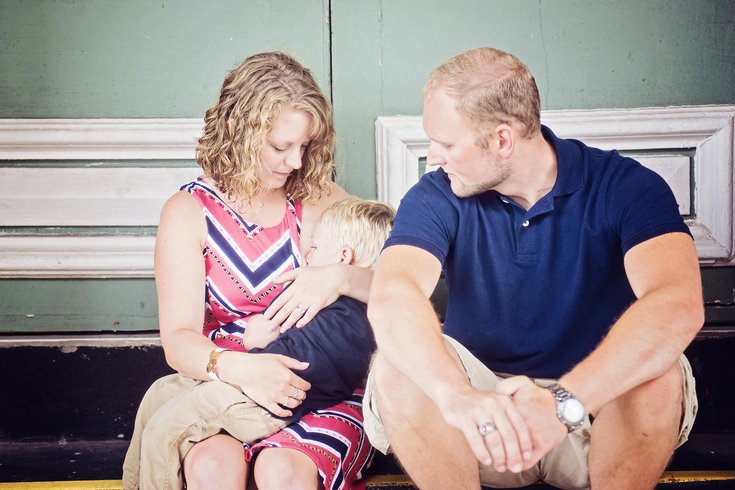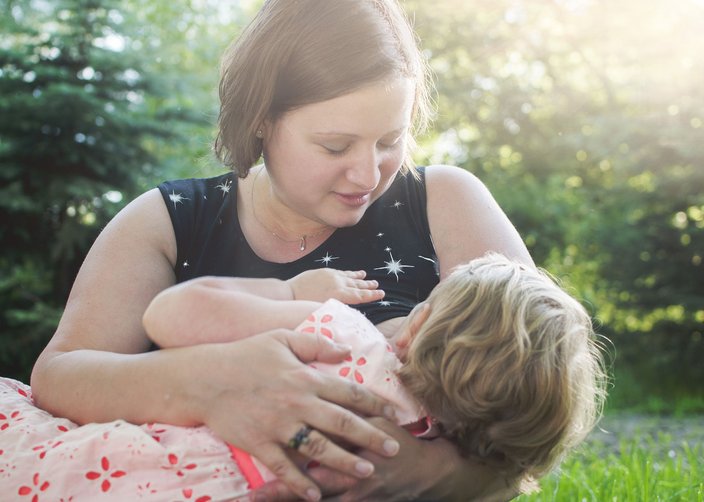
June 15, 2015
 Michele Sylvester Photography /for PhillyVoice
Michele Sylvester Photography /for PhillyVoice
A mother breast-feeds her 3-year-old son.
“Asked my 6-year-old if he still remembers how my milk tasted. He said yes: like water and milk, and a bit of watermelon. Like many things and like love. It tasted of love.”
– Veerle, Belgium
Love. If one word could begin to fully summarize my own experience as a breast-feeding mother, it would be “love.” Some of the most precious memories that I pray will grace my consciousness before leaving this world involve nursing my son as we both drift off into dreamland.
“But it’s a one-way memory,” my friend Sarah asserts.
Is it?
Certainly, implicit, or non-conscious, memories drawn from our earliest experiences profoundly shape us. A great deal of research connects breast-feeding, maternal responsiveness and skin-to-skin contact with the development of secure attachment bonds in infancy and beyond. I don’t remember breast-feeding, but I’m truly grateful for the thousands of hours I spent being held close to my mother’s body. These implicit memories helped shape my sense of safety, attachment and trust in the presence of goodness in our world. But what of individuals who breast-fed into the third, fourth or fifth year of life? Do they remember -- consciously remember -- breast-feeding?
Veerle, the mother from Belgium quoted above, describes herself as “very passionate about breast-feeding.” Her son breast-fed until he was 4, and when it came to weaning, he had “a natural and happy transition without any tears.” Veerle describes that the only “truly hard part” about her journey as a breast-feeding mother was dealing with the social pressure and judgments about nursing her son. “Going against my instincts was simply an impossibility,” she states. “In most of the world and throughout history, it has been just normal, natural to breast-feed a toddler."
She’s right.
According to the Childbirth Postpartum and Professional Association (CAPPA), the average age of weaning around the world is just over 4 years. Yes, 4 years. In the United States, 75 percent of children are weaned by the time they are 1, and the average age of weaning in the United States is 3 months. This painful juxtaposition inspired former U.S. Surgeon General Dr. C. Everette Koop to state, “It is the lucky child [in America] who still breast-feeds past 2 years old.”
University of Delaware anthropologist Katherine Dettwyler notes that it is biologically normal for children to breast-feed even up to 7 years of age, with 3-5 being the most common window for weaning. In a recent National Public Radio piece entitled, “What’s Right About a 6-year-old Who Breast-feeds,” Dettwyler states: “My research, and research by others on non-human primates and non-primate mammals, suggests that nursing large-bodied mammalian offspring for many years, until their first permanent teeth erupt (5.5-6.0 years in humans), is ‘natural’ for humans in the sense of being what the underlying evolutionary, biological/physiological norm is for us as a species.”
According to Canadian psychology professor Carole Peterson, very young children can remember past events. However, by the time children are around 10, these events are replaced by more recent memories that “crystallize.” Therefore, it isn’t surprising that many of the women and men I interviewed said they didn’t remember breast-feeding even though they nursed into their third, fourth or fifth year of life. “My oldest three nursed past 5 years and none of them remember it,” states Laurie from Wyoming. Furthermore, breast-feeding was so thoroughly integrated into the daily fabric of life – akin to brushing one’s hair – singular memories alone stand out, if any do at all.
For example, even though Kateland Woods from Kennett Square, Pennsylvania, was breast-fed until she was around 7, she has only one vivid memory of it. “I remember being in the bathtub with my mom. I was about 5 years old. I specifically remember asking to breast-feed. I remember the comfort of nursing.” Woods reports she “never got sick” and doesn’t feel any stigma about her breast-feeding experience. “I don't think anything of it. I never thought it was weird.”
Only in a culture that has sexualized the female form so thoroughly would natural or full-term breast-feeding be construed as “weird.” New York-based poet, writer and lactation consultant Wendy Wisner recently responded to “10 Myths About Breast-feeding Older Children.” The fear that children would “remember it” ranked among the top 10 myths to dispel. Wisner affirms how long a child nurses is “entirely something (a mother) and her child get to decide” and laments that people think breasts are “basically sexual, and toddlers and young children will be somehow traumatized if they have nursing memories.”
Certainly, we have a long way to go with regard to supporting American mothers and children who chose to breast-feed to the natural age of weaning. Rather than project our hypersexualized fears onto children, an examination of what people recall about breast-feeding reveals a plethora of meaningful memories full of connection, love, tenderness, humor and attachment.
“I dislike when people say kids shouldn't remember. I want my son to, and I want him to remember it fondly. I hope he carries with him those feelings and respect for women. He turned 4 last month, and though some days when we are busy he doesn't ask, other days he very much does.”
– Shannon, Canada
Few have formally studied what people remember about their childhood breast-feeding experiences. A 2009 study of 114 Australian children entitled “‘As Good as Chocolate’ and ‘Better Than Ice Cream’: How Toddler and Older Breastfeeders Experience Breastfeeding,” was the first examination of its kind in Australia.
In her 2010 debut, “Breastfeeding Older Children,” British author Ann Sinnott devotes a short section of her book to “Children Speak” and highlights “children’s joyous comments” when they are asked about breast-feeding. For example, Sinnott quotes from an English mother currently nursing her 4-year-old son: “He likes stroking my breasts and when he is feeling very affectionate, he kisses them and says they are beautiful. He says he would like to have mummy milk forever!”
The women and men I interviewed recall memories that range from tender to comical. Consider the story of Kallen, an Arizona mother who was breast-fed until she was 4. “I don't remember much about it, but I remember once my dad was baby-sitting us as my parents had separated. I was sad and wanted to nurse. He kept telling me that I couldn't because my mom wasn't home. I finally convinced him to let me try. LOL. Such an awkward memory now!”
Christy in New Jersey laughs: “I also remember my mom talking about how she ate a lot of broccoli when I was a baby, so I always imagined her milk was like cream of broccoli soup.”
Children often associate breast-feeding with the sweet taste of comfort foods or the joy of an embrace. According to Anne in Wyoming: “My 7-year-old who weaned on his own two weeks after turning 4 tells me he loved ‘nee nee.’ He says it felt like a warm hug and tasted like vanilla ice cream.”
Adults reflecting on their breast-feeding years tend to emphasize the emotional tone and energy of the maternal-child connection. For example, Sinnott quotes a 38-year-old British woman: “My main memories are of feeling totally warm, loved, and safe as I snuggled into mum’s body and breathed in her smell and fed to sleep.”
At times, sadness and longing are reflected in breast-feeding memories. Miranda, who was breast-fed until she was 4, has “absolutely no memories of nursing.” Yet, she remembers her mother’s sweet scent and “liking being in her bed or smelling her pillowcase or nightgown because it smelled of her.” When Miranda was around 9 or 10, she remembers noticing that her mother’s bedroom no longer smelled like anything particular. “I had lost that ability to smell her and I remember being sad about that."
Tanessa in Ohio tandem breastfeeds her 3-year-old daughter and 5-month-old son. She states: “My friend's husband remembers. He has comforting things to say about it. My daughter will be 4 in September. I hope she has some memory of it as she grows. It's been one of the most rewarding experiences of my life.”
“Mommy, please me have some nummies?”
My 3-and-a-half-year-old son looks up at me. He pulls on the bottom of my shirt. Two hundred acres of forest surround us. It’s a beautiful Monday morning. “Sure,” I reply. “Let’s walk a little more until we find a bench. Then we’ll stop and take a break.”
Within five minutes, we find a resting spot. My friend Adrienne, pregnant with her second child, sits next to me. Her soon-to-be-3-year-old son Walker examines a spiderweb nearby. My son breast-feeds. Adrienne and I continue our conversation. A sense of calm and ease descend. Everything slows down. We rest. Within a few minutes, Walker comes over. He stands quietly by and watches.
“He’s getting milk like you used to do,” Adrienne explains with a smile. He smiles gently.
Later that evening, Adrienne calls me. “As soon as we got home, Walker went to my art books and opened one up to a specific page. When I looked, I smiled. ‘It’s like Mary and baby Jesus,’ he tells me, pointing to a famous painting of the virgin breast-feeding.”
In my three-and-a-half years of breast-feeding, there are moments that indeed have felt holy. I smile when I imagine little Walker making such astute artistic and spiritual connections. Yet, any breast-feeding mother of a toddler will tell you that there are times when breast-feeding is challenging and difficult. At times, it takes great effort -- or surrender -- to center one’s awareness on any shred of tenderness at hand. Jessica Schaefer from West Orange, New Jersey, recalls:
Tonight, when a very overtired 2-and-one-half-year-old would not come to bed, I lay down and rested myself. She, of course, came over and lay by me and demanded nursies. "I don't think so," I said. "I'm a little frustrated because I've been waiting for you a long time."
"I here!" she said, frustrated.
"Yes, but now I'm tired. And sad."
I heard her sleep suit zipper in the dark. "Please tell me you're not taking your pajamas off," I said.
"I get you nursies. You sad. Here, Momma." she said, pulling me to her chest. "You go first."
Note: The featured photo at the top of this article is courtesy of Michele Sylvester Photography.
Interested in Amy Wright Glenn's work? Sign up for Amy's email newsletters today.
Follow Amy on Twitter: @amywrightglenn
Add Amy’s RSS Feed: Amy Wright Glenn
